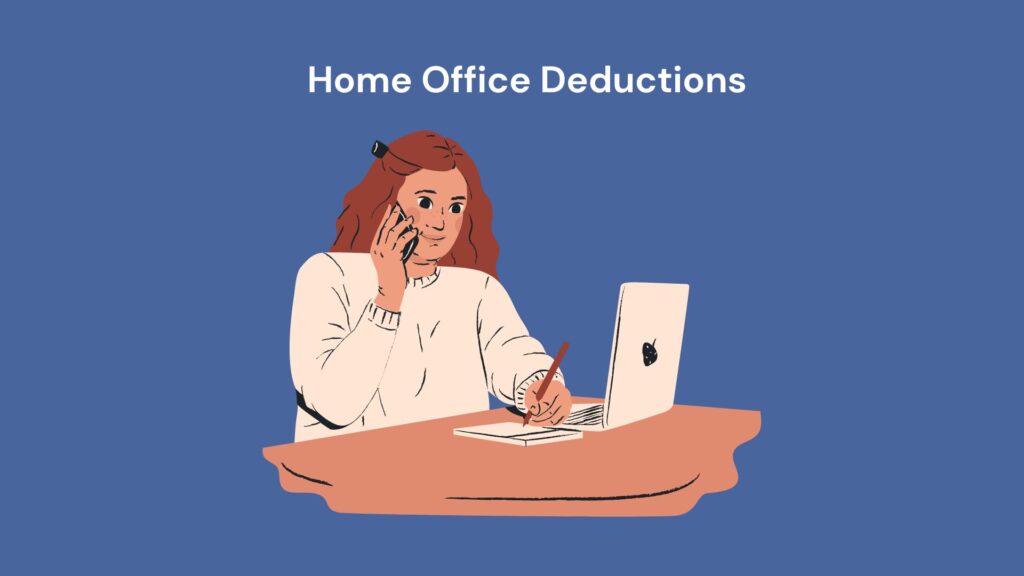People around the world have started to work from home as it is convenient. Small business owners who work from home could significantly reduce their tax obligations by claiming the home office deduction, as long as they comply with the IRS requirements.
The IRS allows you to deduct connected rent, utilities, real estate taxes, repairs, maintenance, and other associated costs if you use a portion of your house exclusively for business-related activity.

Who Can Qualify For Home Office Tax Deductions?
Under the current law, only self-employed individuals are eligible for the home office deduction. You are not qualified for tax deductions if you are an employer for a company that uses a hybrid model.
You can utilize the deduction for any type of home where you live, including single-family homes, apartments, and houseboats. Whether you own or rent can impact eligibility for the deduction. This article is general information. In order to ensure compliance, we implore you to speak with a CPA before claiming any home office tax deductions.
In order to be eligible for the home office deduction, your home office must fulfill specific requirements. You can even use a studio, garage, or barn space as your home office, as long as it meets the following requirements:
Exclusive and Regular Use
Exclusive use indicates that you must use a portion of your home regularly and solely for business purposes. The IRS has clearly stated that if you have made your bedroom or any corner of your home a home office, then your children should not be there.
All kinds of personal activities should not be done in the office space. You should only use the space for work purposes unless:
- You have a license, certification, or approval to a daycare facility under state law. Only then you will be eligible to claim business deductions if you offer daycare services for kids, the elderly (65 or older), or disabled people in that area of the house.
- You are using the space as storage for your business inventory
Principal Place of Business
Your home office must be either the main place of business or a place where regular client or customer meetings take place.
According to the IRS, this indicates you use the home office space entirely for business tasks such as billings, inventory, record keeping, etc.
If you meet the requirements provided by the IRS, you will be eligible for home office tax deductions.
Calculation of Home Office Tax Deductions
Your home office business deductions are based on two methods: a simplified one and a standard, complicated method.
It has been advised that in order to maximize the cost of your home office, you should evaluate your costs using both approaches to identify which one results in the greater cost.
1. Standard Option
When using this approach, you deduct your actual costs. Some of your direct expenses, such as the price of painting or making repairs to that particular area, are fully deductible.
However, indirect costs like mortgage interest, insurance, home utilities, and real estate taxes are tax-deductible depending on the proportion of your property that is used for business.
More instructions about the calculations are mentioned in the IRS Form 8829.
Example
Direct Expenses:
Paint= $200
Indirect Expenses:
mortgage interest= $3000
insurance premiums= $1000
Utilities= $3000
If your home office takes up 300 square feet in a 2,000-square-foot home, you may be eligible to deduct indirect expenses on 15% of your home.
300/2000 = 15%
Indirect expenses deduction
= 15%*($7000)
= $1050
As the direct expense deduction is 100% then the total deduction will be:
=$1050+ $200
=$1250
2. Simplified Option
If your home office is 300 square feet or less and you choose to take the simplified deduction, the IRS offers a deduction of $5 per square foot of your house that is used for business, up to a maximum of $1,500.
You qualify for this deduction if you meet the requirements; you don’t need to keep track of precise expenses to claim this tax credit.
Other Home Office Deductions
Some other home deductions include:
- If you are self-employed, you may be eligible to deduct additional costs for setting up an office in your house.
- If you work full-time but also do some freelancing, you may be eligible for some tax deductions.
- Furniture and equipment are also deductible as business costs on Schedule C.
- If you are not working, searching for jobs, and you start some business for the time period then you may get some tax deduction.
Consult Our CPA
Please note that this is general information, and for all home office tax deductions, we recommend you contact our CPA. Our tax experts can help you verify your eligibility for tax deductions. They will also help you understand independent contractors and freelancers. The information in this article is general, and home office deductions are a case-by-case basis.
